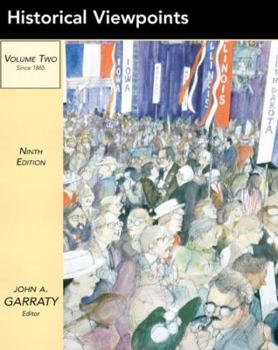Historical Viewpoints: Notable Articles from American Heritage, Volume 2
Select Format
Select Condition 
Book Overview
The revision of this exciting collection of secondary source articles from the popular magazine American Heritage features one of the best representations of American historical thinking available.... This description may be from another edition of this product.
Format:Paperback
Language:English
ISBN:0321102118
ISBN13:9780321102119
Release Date:July 2002
Publisher:Pearson
Length:320 Pages
Weight:1.10 lbs.
Dimensions:0.6" x 7.1" x 9.8"
Customer Reviews
1 rating
History as Literature
Published by Thriftbooks.com User , 20 years ago
These articles were selected from "American Heritage" to provide in-depth details missing from general history books. They do not teach 'official history', so expect to have your assumptions challenged by fresh points of view. Good history should be enjoyed like good literature. The two dozen articles can't be easily summarized. David Hapgood's article on Henry George explains the origin of the "Single Tax", and how this theory evolved from observed facts. Richard Hofstadter's essay seems like advocacy, not history, and is not as good as the surrounding articles. Thurman Arnold's article on the Sherman Anti-Trust Act points out the twin evils of concentrated economic power: high prices due to a lack of competition, and the destruction of local businesses and draining away of local capital. John Garraty reconsiders William Jennings Bryan as a progressive Democrat and a Fundamentalist Christian. John Scott's article on Jane Addams tells how a charity can gain popular support, and then use this for political purposes. Robert Gallagher's interview with Alice Paul explains the need for a federal amendment rather than using state referenda. William Leuchtenburg doesn't tell what bankers, merchants, and manufacturers wanted with the Spanish colonies in the Pacific. Corporate controlled newspapers created "American gullibility about foreign affairs" (p.209). Harold Larrabee tells of the American opposition to imperialism (p.219). Thomas Bailey lists Woodrow Wilson's skill as a rhetorician ("the war to end wars"). His "Fourteen Points" was a masterpiece of propaganda. Colonel T. N. Dupuy says "the U.S. government, its senior leaders, and its commanders in Hawaii had had sufficient information to be adequately warned that an attack was possible, and had had time to be prepared to thwart or to blunt the blow" (p.235). Charles Mee Jr. provides a nicely balanced interpretation of the Cold War. This continued WWII prosperity built upon deficit spending. Page 269 explains why the use of atomic bombs was not necessary. John K. Galbraith analyzes the causes of the Great Depression after the prosperity of the 1920s. One cause was the bubble in corporate investments, a pyramid of holding companies. The stock market boomed as securities would greatly increase in value even if they never paid a dividend! David Rothman explains how low wages and periodic unemployment created poverty among wage-earners. David Bennett tells of the Townsend Plan and its flawed "value added" sales tax that would have hurt workers. Allan Nevins considers FDR's place in history. His greatness was a product of his situation (p.317); FDR used other men's thoughts (p.318). Richard Wade analyzes "The American City", and the progress from 1900 to 1970 (p.331). Corruption in the cities reflected a diverse and non-egalitarian society, different from small towns. Suburbs grew from railroads and then automobiles; but they are no more self-sufficient than the cities (p.339). Larry King writes abo






